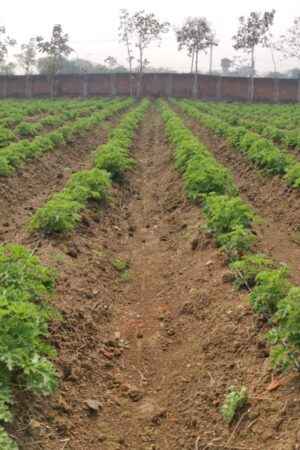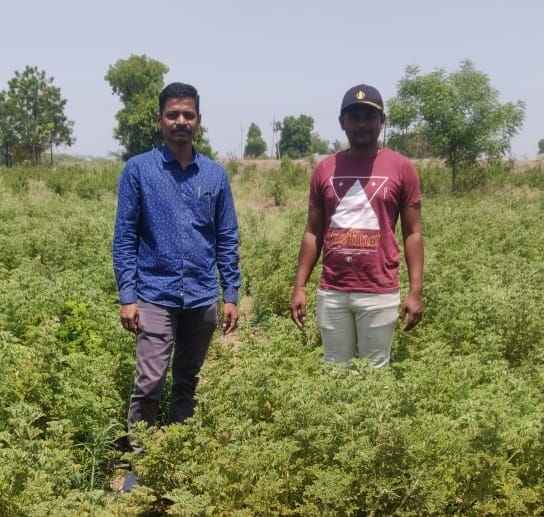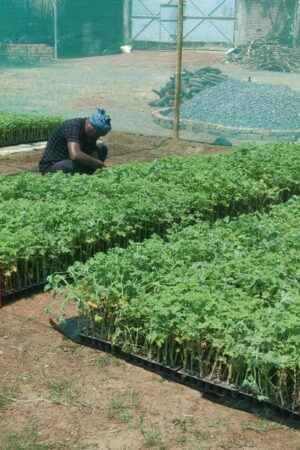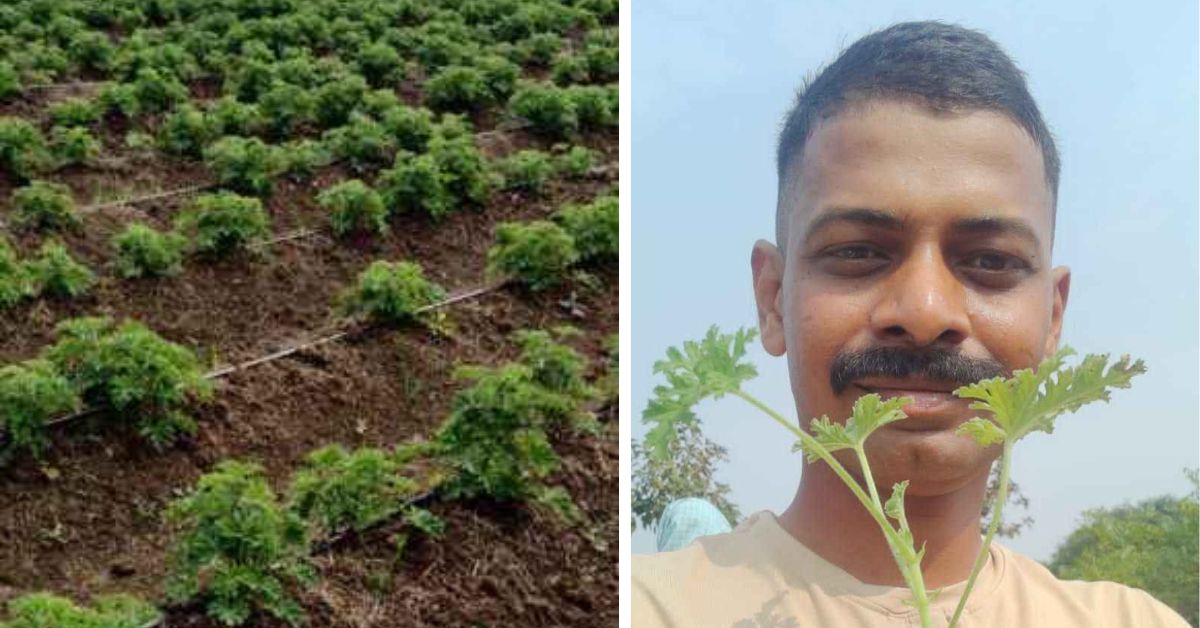Engineer-Turned-Farmer Brings Geranium Farming to Chhattisgarh, Uplifting Villages with Eco-Friendly Innovations
Step into the lush, low-waste fields of Jayramnagar in Chhattisgarh’s Bilaspur, and you might catch a whiff of something extraordinary — a natural aroma that’s not just transforming the air but also the lives of farmers.
At the heart of this green revolution is Lokesh Patade, a former electrical consultant who swapped high-pressure boilers for high-value blooms. Today, he’s leading a sustainable farming movement built around geranium, a resilient, pest-resistant plant that offers multiple harvests, minimal inputs, and zero-waste potential.
From distilling essential oil to creating organic air fresheners from byproducts, Lokesh is proving that with the right crop, farming can be both profitable and planet-friendly.
Lokesh’s story isn’t your typical tale of rural roots. Just a few years ago, he was troubleshooting high-tech boilers for a South Korean manufacturer based in India, far from his family and even farther from the world of agriculture. “I wanted to be around for my growing daughter,” Lokesh recalls. “And I wanted to do something that would make a real difference—both for my family and for the environment.”
 Geranium, often called the “poor man’s rose,” is a game-changer for farmers.
Geranium, often called the “poor man’s rose,” is a game-changer for farmers.
With encouragement from his wife Priyanka, a plant biotechnologist, Lokesh leaped at 35, investing Rs 80,000 to plant his first acre of geranium. Today, he earns nearly Rs 10 lakhs annually from geranium and vegetable cultivation, with an additional Rs 2 lakhs from value-added products.
Sweet smell of success
Fast forward to today, and Lokesh’s three-acre Meadow Agrotech farm is buzzing with innovation. It became the first to cultivate, harvest, and extract Rose Scented Geranium (Pelargonium graveolens) oil in Chhattisgarh State.
Not only has he cracked the code on growing geranium—a crop previously unheard of in Chhattisgarh—but he’s also become India’s first manufacturer of organic, hydrosol-based air fresheners.
 Its essential oil fetches up to Rs 11,000 per litre and is in hot demand for cosmetics, perfumes, and aromatherapy.
Its essential oil fetches up to Rs 11,000 per litre and is in hot demand for cosmetics, perfumes, and aromatherapy.
His secret? Blending traditional farming wisdom with cutting-edge technology, including AI tools like KissanGPT, which he uses to perfect everything from distillation techniques to eco-friendly product development.
A ‘poor man’s rose’ that’s making farmers rich
Geranium, often called the “poor man’s rose,” is a game-changer for farmers. Its essential oil fetches up to Rs 11,000 per litre and is in hot demand for cosmetics, perfumes, and aromatherapy.
Lokesh’s fields yield up to 50–60 litres of oil per acre each year, and the plant’s natural resistance to pests means lower costs and fewer headaches. “Once you plant geranium, you can keep harvesting for three to four years,” Lokesh explains. “It’s resilient, profitable, and sustainable—everything a modern farmer dreams of.”
 With encouragement from his wife Priyanka, a plant biotechnologist, Lokesh leaped at 35, investing Rs 80,000 to plant his first geranium.
With encouragement from his wife Priyanka, a plant biotechnologist, Lokesh leaped at 35, investing Rs 80,000 to plant his first geranium.
But Lokesh’s impact goes beyond his fields. Through workshops, digital platforms, and good old-fashioned word of mouth, he’s inspiring a new generation of farmers to embrace high-value crops and smart agriculture. The numbers speak for themselves: while India consumes around 149 tons of geranium oil annually, it produces only about five tons, leaving a vast market wide open for enterprising growers.
Geranium farming: A low- maintenance, high-return opportunity for farmers
- High-Value Crop: Geranium offers a significant income opportunity for farmers due to its high market value.
- Multiple Oil Sources: Oil can be easily extracted from the plant’s stems, leaves, and flowers.
- Long-Term Yield: Once planted, geranium can be harvested for three to four years, reducing replanting costs.
- Low Maintenance: The plant requires minimal pesticide use, as it is naturally resistant to pests and grazing animals.
- Higher Returns: Yields much higher profits compared to many traditional crops.
- Sustainable Livelihood: Promoting geranium farming could help farmers increase income and financial stability.
Geranium was first introduced in the temperate regions of South India, particularly in the Nilgiris (Tamil Nadu), parts of Karnataka, and Himachal Pradesh, due to their suitable climate. A medicinal and aromatic plant, it is not eaten by animals and rarely attacked by pests. Its leaves start to grow shortly after harvest, and farmers can easily earn more profit.
Geranium is valued for its leaves, which are processed to extract essential oil. This oil is in high demand both in India and internationally. Once planted, geranium can be harvested four times a year for about four years, yielding 15–16 tons of leaves every three months. Geranium plants require less irrigation making them a practical alternative to traditional crops like paddy and pulses.
 Lokesh’s fields yield up to 50–60 litres of oil per acre each year, and the plant’s natural resistance to pests means lower costs.
Lokesh’s fields yield up to 50–60 litres of oil per acre each year, and the plant’s natural resistance to pests means lower costs.
A resident of Bilaspur, Patade cultivates geranium—the Egyptian variety (Pelargonium graveolens) also called the Kelkar variety—on three acres of land, at Rs 80,000 per acre. Harvested every third or fourth month, a geranium plant continued to produce leaves for three to four years.
Training farmers
“While various medicinal and aromatic plants like lemongrass and palmarosa were already being cultivated in his region, geranium was largely unknown to local farmers. Geranium is widely grown both in India and abroad, and, like other aromatic plants, its essential oil can be refined and has a strong market demand,” says Patade.
Meadow Agrotech, is an incubated startup of IGKV RABI, (Indira Gandhi Krishi Vishwavidyalaya – Research and Business Incubation), located in Raipur, Chhattisgarh. An agricultural innovation and business incubation hub, it supports startups and entrepreneurs in the agri-business sector.
 High-Value Crop: Geranium offers a significant income opportunity for farmers due to its high market value.
High-Value Crop: Geranium offers a significant income opportunity for farmers due to its high market value.
He has been leading training sessions for farmers across Maharashtra to raise awareness and expand Geranium cultivation, to bring 100 acres under cultivation. Patade has gone beyond traditional farming by pioneering the production of hydrosol air fresheners—an innovation that marks a first for India. To support this venture, he established a distillation unit with a capacity of 500 kg.
What is the hydrosol process?
Priyanaka, recipient of the Academy of Plant Sciences’ Young Scientist Award in 2009 and author of several research papers, explains the hydrosol process. “This process helps preserve geranium’s therapeutic properties by capturing both water-soluble and some volatile components from the plant material during steam or water distillation. When geranium leaves and flowers are distilled, steam passes through the plant matter, extracting aromatic and bioactive compounds. The resulting vapor is then condensed, separating into two main products: essential oil (the oil-soluble fraction) and hydrosol (the water-soluble fraction).”
Organic air freshener that encourages sustainable farming and reduces waste
Patade’s geranium hydrosol air fresheners—available in 200ml cans on e-commerce sites—offer a natural, eco-friendly alternative to chemical sprays. Made from the byproduct of geranium oil extraction, they provide a sweet, floral aroma that uplifts mood and reduces stress.
The hydrosol’s natural antibacterial and antimicrobial properties help purify air and surfaces, while its scent repels insects, making it both pleasant and practical. Free from synthetic additives, these air fresheners are safe for children and pets. By utilizing a byproduct, they also support sustainable farming and reduce waste, offering gentle therapeutic benefits for both people and the environment.
 Free from synthetic additives, these air fresheners are safe for children and pets.
Free from synthetic additives, these air fresheners are safe for children and pets.
In his effort to help more farmers adopt hydrosol technology, he has trained and transferred his expertise to a geranium farmer in Maharashtra’s Ahilyanagar district. “We’re not just growing crops,” Lokesh says, gesturing toward his flourishing fields. “We’re growing possibilities. Every farmer who switches to geranium isn’t just changing their income—they’re changing their future.”
Lokesh’s journey is proof that with vision, courage, and a little help from technology, anyone can plant the seeds of change—and watch them blossom into something truly remarkable.
Edited by Vidya Gowri Venkatesh; All Pics Courtesy Lokesh Patade, Meadow Agrotech
News